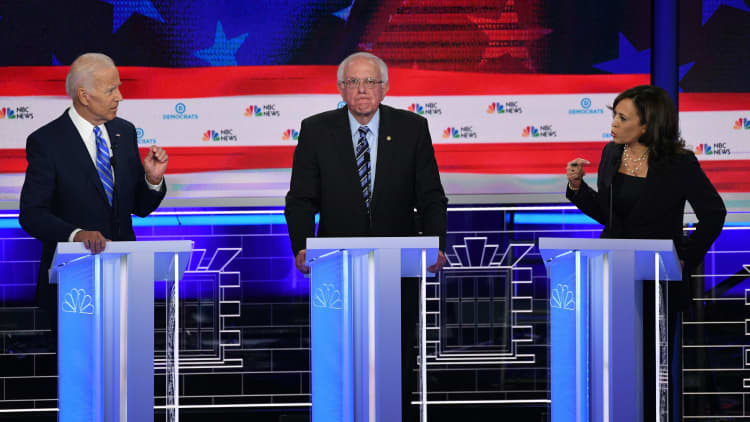Texas Rep. Will Hurd's decision not to seek reelection highlights a big problem for Republicans as 2020 nears: their inability to diversify their ranks and connect with the black community. Hurd's departure will leave Sen. Tim Scott as the only black Republican in Congress.
And even Scott has vowed to leave Congress after his next term.
President Donald Trump's 2020 campaign has made efforts to reach out to black voters, hoping that highlighting its economic successes might encourage a new generation of black voters in the coming election.
"We continue to engage black voters across the country this cycle, spreading the message of the substantive policies and accomplishments of the Trump Administration that are benefiting our communities, from near record-low unemployment to historic criminal justice reform," says Kamilah Prince, director of African American engagement at the Republican National Committee.
But inflammatory rhetoric from the president and his allies threatens any gains Republican operatives hope to achieve.
Just last month, Trump criticized Rep. Elijah Cummings' district in Baltimore, in an exchange many interpreted as racist. In a recent Quinnipiac poll, 80% of black respondents said the president is racist.
GOP's perception problem
The party's struggle with black voters is likely to continue, says Eric McDaniel, associate professor at the Center for African and African American Studies at The University of Texas at Austin.
"Until the party commits itself to working against racial bigotry, [Republicans] will have a hard time," McDaniel says. "There might be a lot of things that [black voters] line up for policy-wise, but at the end of the day race is always there."
Trump has long been at odds with the African American community, from his condemnation of the Central Park Five and discriminatory housing practices while working for his father's business, to his promotion of birther conspiracies that claimed former President Barack Obama was not born in the United States.
"The president is perceived by many in the United States as racist. That's bad advertising and negates the praise he wants" for his policies that affect black communities, says Andra Gillespie, associate professor of political science at Emory University. "People can't separate the behavior from the messenger."
The GOP has made efforts to correct the dearth of black conservatives in Congress. It supported a number of strong black candidates in battleground states during the midterm election. While it didn't pull off big wins, it made some progress.
John James' 2018 senatorial bid in Michigan was a bright spot, as he narrowly lost to incumbent Sen. Debbie Stabenow in a state that hasn't had a Republican senator since 2001. He, along with other black candidates such as Wesley Hunt of Texas, are hoping to remake a party that has not only struggled to diversify but has often seemed to discourage it.
Parts of the party's platform could resonate with minorities if it could get past perceptions of bias. Black voters are not politically homogeneous, diverging on issues including immigration, abortion rights and government spending. However, black voters tend to rally around Democrats come Election Day.
"Even when you have black conservatives who identify with the Republican Party, when it comes to Election Day, especially presidents, it comes down to the party who protects civil rights," said Ted Johnson, senior fellow at The Brennan Center for Justice. "Every other question is by the wayside."
Civil rights come first
Black voters across the political spectrum prioritize civil and voting rights and have long memories, Johnson says. Black voters were equally split between the parties until the Civil Rights era, when support dramatically swung to the Democratic Party.
According to a Pew Research Center poll in 2018, 84% of African Americans identify with or lean toward the Democratic Party, compared with the 8% that identify more with Republicans. Of those, only 3% are registered Republican voters.
Today, black voters are a critical component of the Democratic Party, making up around 24% of the Democratic presidential primary voting block.
Across the aisle, the Republican Party's increasing homogeneity threatens its very fabric in the long term, says Patrick Murray, director of the Polling Institute at Monmouth University.
"They could become a fringe party that is very narrow in terms of its policies and representation," Murray says. "Where that really hurts is in states where there are a number of moderate Republicans, who become tarnished by the national brand."
Whit Ayres, founder and president of North Star Opinion Research, says a diverse Republican Party lies ahead, despite its current state. Ayres worked for Sen. Marco Rubio's presidential campaign in 2016.
"We had a rally in the South Carolina primary in Charleston, and Marco Rubio, Nikki Haley, Tim Scott and Trey Gowdy were on the stage," Ayres said. "They presented a different face to the American electorate. I took a picture of that rally and said, 'This is the face of a successful Republican Party.'"



